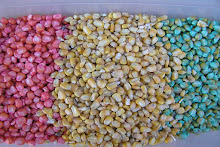In my last post I gave a "teaser" talking about ways to "double" your money off of a positive move. I'd like to hedge that talk a little and just focus the discussion on "leveraging" your gains (or losses) on a move in an underlying. In this case, we will focus our discussion on the precious metals.
The reason I'm talking about the precious metals is that I view it as one way to "hedge" currency risk in the dollar. By "currency risk" I'm referring actually to inflation risk, or the expansion of money and credit creation spilling over into the things that you want to or need to buy in the future and thus making your savings less "valuable" to you, the saver.
Why leverage?
Leverage will accelerate the gains (or losses) in the underlying. The reason we are looking for leverage is that (if we are not speculators, and indeed hedgers) is that the insurance that we are looking to buy for our portfolio will be viewed as "dead money". In other words, it is an invest
ment that pays off primarily when things are going poorly for other asset classes.
Gold vs. the Dollar
While we are actually hedging losses in the dollar, I don't have any "hard and fast" data regarding dollar losses and gold (bullion) gains.
It is widely reported that the dollar has lost 30% of its value since 2001. During that same period, gold has nearly tripled.
Gold is money. These kinds of seemingly "outsized" gains have been caused by:
1.) an overadjustment down and up in gold based on recent dollar moves
2.) other currencies inflating or "debasing" along with the dollar thus masking part of the value that has been lost over the last 5 years.
Mining shares vs. Gold
Mining shares have shown to have *around* a 2.5-3 to 1 relationship to the underlying asset on the way up. However, in times of *serious* panic, the shares will probably not do as well in the short run as bullion. If people get comfortable that the sky is not going to fall, and that the mines will have the time to extract their metal without worrying about little things like nuclear winter and a ready market to sell their product to, they will outperform.
I took down some information from the markets and yesterday's movement in gold and silver which was quite strong in order to give you an idea of the relative movements of some of the vehicles for trading the metals market. I will include them in my next post, when we get down to "brass tacks" (no pun intended).
Shares vs. Options
A further way to leverage your price movement is through the use of options (or warrants for Canadian investors). For the purposes of our discussion I will limit myself to options.
Options are exactly that...options to buy (a call) or sell (a put) a specified security at a specified price (or strike price) on or before a specified date (the expiration).
For a call option, the lower the strike and further out the expiration, the more expensive the option. Makes sense if you think about it.
However, just so things are too simple for you, the options' pricing doesn't usually move in a one to one relationship with the underlying stock. For example, if the stock is "way out of the money" or at a price significantly above the current price and it is questionable whether the stock will reach the strike before expiration, the stock will understandably not move up on a 1 for 1 basis with the underlying stock movement.
So why buy them?
Well, a stock that is trading at 50, could have an option to buy at 55 trade for as little as $1 (or less), depending on time to expiration and prospects for future price improvement. In this case, a 12% move in the underlying before expiration and you would double your money. Conversely, if the stock does not move up at least 10%, you would lose your investment.
The discussion of leverage vs. risk management could fill the library of Congress, so I'll just stop there before losing the one person that actually go to this point in the post. In my next post, I'll be more specific about a couple of different strategies, try to outline the risks, and talk about who such strategies may be appropriate for.
Ciao for now,
fuBarrio
Subscribe to:
Post Comments (Atom)


3 comments:
Hey Fubarrio, I was the one reader who got to the end of the post. Options would be great if we didn't have to pay commissions to get them. .. butterfly, anyone?
yes. certainly there is a cost to doing any of this...
commissions are much thinner on options than buying bullion however....a much bigger consideration/cost (if you're buying options vs selling) is probably time decay.
as you point out, there are some strategies for reducing (or attempting to reduce) the "costs" of trading options.
i'll prob try to cover a couple of them, but i don't want to completely lose my other two readers so i'll try to keep it relatively simple! :)
ciao,
fuBarrio
Here's a very interesting article with charts comparing historical leverage of silver-to-gold with gold-stocks-to-gold:
www.kitco.com/ind/Watson/jan082007.html
-- Shirley
Post a Comment